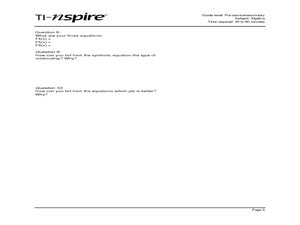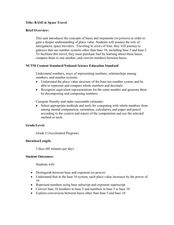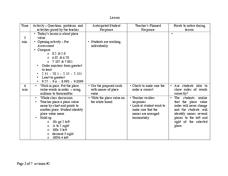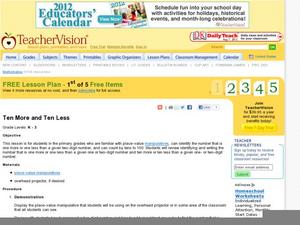Curated OER
Why is this lesson constructivist?
Students formulate a definition of tessellations by comparing and contrasting different patterns and shapes of real objects. They discuss the relatioship between shapes and patterns as well as their function in the real world. Students...
Curated OER
TI-Nspire Activity: What Does Your Representation Tell You?
By learning to select the best representation for three meal plans, students compare three meal plans to determine the best choice. Data for the meal plans is sorted on a table, as an algebraic equation, and graphed on a coordinate grid....
Curated OER
Problem Solving
Fifth graders read and write equations. In this equation writing lesson, 5th graders use real life scenarios to write equations. Students use manipulatives, draw pictures and make tables to understand how to write equations. Students...
Curated OER
Rep Tiles
Third graders use pattern blocks of one shape at a time to try to create a similar shape. They compare the perimeter of the new figure with the perimeter of the original shape and look for a pattern. Students use the pattern to predict...
Curated OER
Sieve of Eratosthenes
Students discover the Sieve of Erathosthenes. They explore a method to find all the prime numbers in a group of numbers. Using models, students practice divisibility rules while examining the difference between prime and composite numbers.
Curated OER
Grade 3: What Can I Make with 30 Centimeters?
Third graders create polygons with perimeters of 30 centimeters, use the centimeter grid paper to determine the area of each shape, and organize the shapes to make generalizations from the patterns they see.
Curated OER
Who Took the Cookies
Students find the missing cookies. In this language arts lesson, students solve the mystery of who is taking the cookies from the cookie jar. Students are read several books with the same mystery of cookies being taken from the jar.
Curated OER
Number Chart and Number Line
First graders research strategies for identifying numbers through 100. In this number recognition lesson, 1st graders make games, create puzzles,and fill in missing numbers to practice number identification.
Curated OER
Four Color Map
Students explore geometry by completing a color puzzle. In this shape identification lesson, students utilize deductive reasoning to complete a Google SketchUp puzzle with trapezoid, triangles and rectangular shapes. Students...
Curated OER
Sequences
Students solve problems using the TI. In this calculus lesson, students evaluate functions using sequences. They graph the functions on the TI and make observations.
Pennsylvania Department of Education
Volume of Compound Figures
Fifth graders use patterns, models and relationships to solve equations. In this equations lesson plan, 5th graders define vocabulary for equations and complete worksheets explaining variables and solving problems.
Curated OER
An Introduction to Sequences
Fourth graders are introduced to arithmetic and geometric sequences. In this mathematics lesson, 4th graders produce a variety of sequences by varying the starting number, multiplier, and the add-on number.
Curated OER
How Does Your Garden Grow?
Students construct and maintain a school garden. In this gardening lesson, students plan the construction of the garden by writing letters to local businesses asking for supplies and materials; students build the garden using their math...
Curated OER
Exploration Sequence of Bounces
New skills are developed as learners use graphing calculators and ranger technology to capture and graph the sequence of bounces a ball makes when dropped. After recording the height of four or more bounces, they use the collected data...
Curated OER
Metric Meals
Sixth graders investigate metric measurements. In this metric measurement lesson, 6th graders explore mass, capacity, and length. Students examine graduated cylinders and balance scales to obtain measurements. Resources are provided.
Curated OER
The Billy Goats Gruff and the Days of the Week
First graders explore the days of the week. In this days of the week lesson, 1st graders listen to the story The Billy Goats Gruff, then act out the events by stepping on "rocks" that name the days of the week. Students must...
Alabama Learning Exchange
Making and Observing Life in a Terrarium
Young scholars understand the parts of the terrarium and why they are important in establishing an ecosystem. In this ecosystem lesson, students recall background information on aquariums, terrariums and the water cycle. Young scholars...
Curated OER
Find Someone
Your class will participate in a series of math vocabulary activities to learn about parallel lines. They find people using a math list and connect math words in the context of sentences. They also read the math words in the example...
Curated OER
BASE-ic Space Travel
For this 3-day place-value lesson, upper-elementary kids investigate the base 5 and base 2 systems as an introduction to exponents and powers. They create a pocket chart to help ground their understanding of bases, exponents, and powers,...
Curated OER
Place Value
Practice place value skills with this lesson. Learners put numbers in order from greatest to least, identify the values of particular numbers, and engage in an activity to compare numbers using manipulatives.
Curated OER
Ten More and Ten Less
Get learners to analyze two-digit numbers based on place value, and use manipulatives to add and subtract both 1 and 10. A place value chart is available, and you can project it during guided practice. Through visualizing...
Curated OER
Investigating Patterns
Fifth graders practice recognizing patters and determining what comes next in a sequence. Using a given website, 5th graders play "The Crazy Pattern Machine," where they recognize and complete given patterns. After completing the most...
Curated OER
Strange Elevators: Creating and Extending Patterns
Second graders solve problems by recognizing patterns, creating patterns and extending them. They compare and contrast patterns.
Curated OER
Patterns and Sequence
Sixth graders explore patterns and sequencing. As a class, they name numbers that fit in a pattern. Students use pattern blocks to construct and identify patterns. They use a calculator to create input and output functions.
Other popular searches
- Growing Patterns in Math
- Number Patterns in Math
- Geometric Patterns in Math
- Pasta Patterns in Math
- Increasing Patterns in Math
- Patterns in Math Quiz
- Repeating Patterns in Math
- Color Patterns in Math
- Identifying Patterns in Math
- Nature's Patterns in Math























